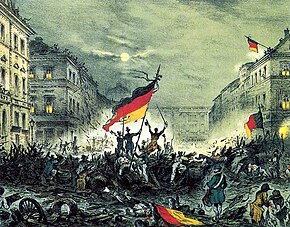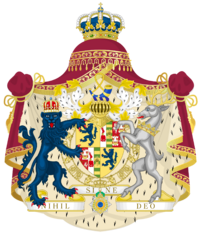Mascyllary Revolution of 1847: Difference between revisions
The ©rusader (talk | contribs) mNo edit summary |
mNo edit summary |
||
| Line 3: | Line 3: | ||
{{Infobox military conflict | {{Infobox military conflict | ||
| conflict = Mascyllary Revolution of 1847 | | conflict = Mascyllary Revolution of 1847 | ||
| image = [[File: | | image = [[File:Ereignisblatt_aus_den_revolutionären_Märztagen_18.-19._März_1848_mit_einer_Barrikadenszene_aus_der_Breiten_Strasse,_Berlin_01.jpg|290px]] | ||
| caption = | | caption = Cheering revolutionary troops proclaim the revolution in Königsreh, on 28 October 1847 | ||
| date = {{start date|df=yes|1847|10|25}} – {{start date|df=yes|1847|12|01}} ({{Age in years, months and days|1847|10|25|1847|12|01}}) | | date = {{start date|df=yes|1847|10|25}} – {{start date|df=yes|1847|12|01}} ({{Age in years, months and days|1847|10|25|1847|12|01}}) | ||
| place = [[Mascylla]], primarly [[Königsreh]] and Lehpold | | place = [[Mascylla]], primarly [[Königsreh]] and Lehpold | ||
Revision as of 22:15, 15 December 2022
This article is incomplete because it is pending further input from participants, or it is a work-in-progress by one author. Please comment on this article's talk page to share your input, comments and questions. Note: To contribute to this article, you may need to seek help from the author(s) of this page. |
| Mascyllary Revolution of 1847 | |||||||
|---|---|---|---|---|---|---|---|
 Cheering revolutionary troops proclaim the revolution in Königsreh, on 28 October 1847 | |||||||
| |||||||
| Belligerents | |||||||
|
| ||||||
| Commanders and leaders | |||||||
|
|
| ||||||
| Strength | |||||||
| 90,000 men, 10,000 Cuthish auxilliary troops | Unknown, up to 180,000 men | ||||||
| Casualties and losses | |||||||
| 900 dead, 2,470 wounded | 2,000 dead, 5,000 wounded | ||||||
The Mascyllary Revolution of 1847 (Hesurian: Maskillische Revolution von 1847), also known as the October Revolution (Oktoberrevolution) was a short period of civil and political unrest in the Mascyllary Kingdom that ultimately culminated in the effects of the 28 October coup d'état: the forced abdication of Lukas II and the proclamation of the Second Mascyllary Kingdom with the coronation of Sophia I as queen and inauguration of Emmanuel Lyder's populist and libertarian national government in early December.
Following the desastrous outcome of the Second Cutho-Mascyllary War (1839–41), the current political establishment and the monarchy under Lukas II in particular earned growing criticism and unfavorable review for the rising influence of the middle and lower class, anticipating the emergence of republicanism through unavoidable class conflict. The discomfort of the fiercly nationalistic populous, paired with a government that grew more authoritarian with the March Laws of 1847 that arbitrarily and unconstitutionally revoked trading rights, led to the rise of an insurrectionist movement originating in Königsreh, later known as the Cornflower Uprising of 1847 (Blaublumenaufstand von 1847). The bloody revolt, though ultimately unsuccessful at last, prompted other riots, especially within the country's military, to rise up and seek the overthrow of Lukas II. The 28 October coup d'état, largely supported by the peasantry and rogue military factions, deposed Lukas II as King, and despite fierce resistance by the government and elements of the coup originally seeking to overthrow the monarchy entirely, elected Sophia I as Queen. The Reichsrat of 1847 was suspended by her and a new government under Prime Minister Emmanuel Lyder later formed.
The revolution, later known as the October Revolution in Mascylla, primarly introduced further protections and rights for the socialist peasantry, such as the constitutional right to work (Recht zur Arbeit), and bolstered support in the existing administration after the coup. While intervention from other Berean powers were limited, the Second Cuthish Empire tried to support Lukas II's monarchy with 10,000 auxilliary forces in order to safeguard its territorial gains of the Ahlstead Wars. The national government formed by the revolution had a strong anti-Cuthland sentiment and thus assumed to steer a more active Berean foreign policy, ultimately contributing to the antagonism between the Cuthish and Mascyllary nations as a whole and the ensuing of the later Great War.
Background and Mascylla before the uprising

